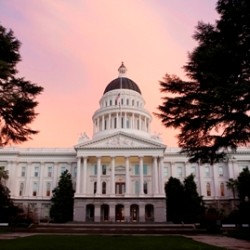iPoker Bill Passes Californian Committee Vote

In late April, California took another step towards introducing online gambling legalization after several hearings on the subject were held. The Assembly Governmental Oversight Committee then voted on whether AB 2863 should be moved on for further consideration by the State Assembly, and the committee subsequently returned a unanimously positive vote. Now, the bill is in the hands of the Appropriations Committee, which will have a chance to debate the bill, hold hearings of its own, and then vote on whether to move legislation down the line toward a final vote in the Assembly.
While the vote is being billed as a win, there is still a long way to go before Californians will be able to celebrate the legalization of online gambling in the state.
The Bad News
One thing that could throw a monkey wrench in the push to legalize online gambling is that not all of California’s tribal casinos are on board. At this time, there exists a major disagreement among tribal leaders in regards to who should be allowed to apply for casino licensing. A group of tribes being led by the Pechanga and Agua Caliente tribal representatives are calling for a bad actor clause to be added to the legislation blocking “bad actors”, such as PokerStars, from being able to operate in the state.
While on the surface, it could seem that the tribes are trying to protect consumer interests by keeping operators who once broke the UIGEA out of the running for licensing consideration, the motivation is actually a selfish one. By blocking PokerStars from operating in California, the tribes will prevent the Morongo and San Manuel tribal organizations from enacting their online gaming agreement with PokerStars.
The Good News
While unresolved tribal issues still loom, there is a little good news for the iGaming bill. The horse racing industry is now supporting the move to legalize online gambling. In order to bring the up-until-now opponents of the legislation on board, the authors of the gambling bill have added a $60 million subsidy for race track operators in the state. Only one track operator, the Stronach Group, remains in opposition to the bill. Otherwise, the industry seems to be satisfied by the subsidy; however, some critics of the legislation argue that it may not be economically feasible for that large sum to be paid.
A New Position
California has gotten this far with bills before only to have them die in committee, but this time around instead of promoting the law as one that would increase personal freedom, the sponsors of Assembly Bill 2863 are instead selling it as a way to improve consumer protection. The bill is seeking to protect Californians who are currently accessing illegal online gambling sites, which are not regulated, and therefore potentially at risk from suddenly folding and walking away with players’ money. Only time will tell if this new position will sway more lawmakers to support the bill than have rallied around similar bills in the past. In addition, the Poker Players Alliance have also adopted a new buzz expression in order to gain further support for iPoker legislation, and that phrase is “poker tourism.”
Poker Tourism
On May 4th, the Michigan Senate Regulatory Reform Committee held a hearing to discuss the Senator Mike Kowall iPoker sponsored bill called SB889. Poker Players Alliance (PPA) executive director, John Pappas, testified at the hearing during which time he took the opportunity to highlight how online poker helps drive player traffic towards land-based poker tournaments.
The phrase “poker tourism” which Pappas coined, and utilized in connection with past arguments concerning tax revenues, and consumer protection, has the potential to create a potent argument which local legislators may be less inclined to ignore. Needless to say, the argument applies equally as well to California, and elaborating further at the Michigan Regulatory Reform Committee, Pappas explained:
“Online poker will also be a unique driver for tourism in Michigan. The coupling of the online game with the state’s tribal and state-licensed poker offerings will make Michigan the mid-west center for regulated poker. It will bring first class poker tournaments to the state drawing players from all over the country and even the world. This type of “Poker Tourism” will fill hotel rooms and restaurants and can be strategically planned to enhance commerce during times of the year when traditional tourism is off its peak.”










